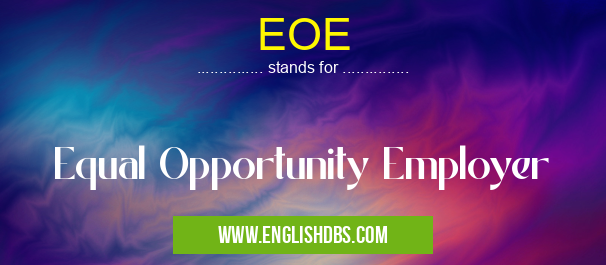What does EOE mean in OCCUPATION & POSITIONS
EOE stands for Equal Opportunity Employer. It is a term used to indicate that all individuals, regardless of their gender, race, ethnicity, sexual orientation, or other protected characteristics, are welcome and can be considered for jobs within an organization. This type of practice is based on the belief that everyone should have access to the same job opportunities and should not be discriminated against because of any personal traits or characteristics. The concept of EOE was first implemented in the U.S. by the Civil Rights Act of 1964, which prohibits employers from discriminating against employees and applicants based on race, religion, sex or national origin. Since then, it has become common practice in many organizations around the world to ensure that they are complying with applicable laws and regulations regarding equal employment opportunity.

EOE meaning in Occupation & Positions in Business
EOE mostly used in an acronym Occupation & Positions in Category Business that means Equal Opportunity Employer
Shorthand: EOE,
Full Form: Equal Opportunity Employer
For more information of "Equal Opportunity Employer", see the section below.
EOE In Business
In business an Equal Opportunity Employer (EOE) policy helps enhance workplace diversity while also providing benefits like increased employee morale and productivity levels than would be seen with a more restrictive policy environment. Additionally companies with an active EOE policy create a more positive public image over those without this statement since it promotes the idea of fair competition among candidates for positions within the company thus increasing trust in the employer from both customers and employees alike.
Essential Questions and Answers on Equal Opportunity Employer in "BUSINESS»POSITIONS"
What is an Equal Opportunity Employer?
An equal opportunity employer (EEO) is a company or organization that provides equal employment opportunities to all individuals regardless of race, color, religion, sex, national origin, age, disability or veteran status. The aim of an EEO is to ensure that everyone has the same access to job opportunities and can compete fairly and equally for those job openings.
What are the benefits of being an EEO employer?
Being an EEO employer brings several advantages such as demonstrating that your business does not discriminate against any applicants and employees, increasing morale and productivity among staff as well as conveying a sense of fairness in the recruitment process. Additionally, it will help attract qualified candidates from a wide variety of backgrounds which can allow your business better insight into new markets and products.
Are there any laws regulating EEO employers?
Yes, there are federal laws which regulate employers and direct them to provide equal opportunity employment practices such as Title VII of the Civil Rights Act of 1964 and the Americans with Disabilities Act (ADA). It is important to be aware of these regulations so that your business remains compliant with existing laws.
How do I create an effective EEO policy for my organization?
Developing an effective policy takes time but is worth investing in to ensure your company meets legal requirements while upholding its reputation amongst potential employees. An effective policy should include clear provisions outlining prohibited discrimination based on protected characteristics such as race, gender identity, sexual orientation etc., guidance on how complaints will be handled in the workplace and regular company-wide training programs on diversity and inclusion.
What are some ways I can show commitment to being an EEO employer?
Commitment towards being an EEO employer should be visible throughout your organizational policies such as recruiting processes for new hires or promotions within departments. You can also consider offering additional benefits like flexible hours or paid paternity or maternity leave in line with legal regulations. Encouraging diversity initiatives like employee resource groups (ERGs) may be beneficial in maintaining consistency with staff members across different demographics.
How often do I need to review my company’s Equal Employment Opportunity Statement?
A comprehensive review should occur annually to ensure compliance with changing regulations and best practice guidelines since policies may need updating over time due to changes in society or industry regulations. Additionally it’s advised that any significant changes undertaken within the organization such as mergers or acquisitions also trigger a full review of existing policies.
How often should I train my employees on implementing Equal Employment Opportunity Policies?
Employees should receive ongoing training on their roles in implementing your Equal Employment Opportunity Policies during their onboarding process as well regular refresher courses at least twice a year along with any updates made.
Why is it important for me regularly report data about hiring employees from different backgrounds?
Regularly reporting hiring data about employees from different backgrounds shows transparency and creates trust within current employees who think you take diversity seriously but also amongst future applicants assessing whether they would fit into an inclusive working environment.
Final Words:
In conclusion EOE means Equal Opportunity Employer and is used to signify that employers do not consider certain factors such as gender when recruiting new employees and instead believe that everyone should have access to available jobs within an organisation. It is important for businesses to embrace this concept both internally with personnel policies as well recording it in written form so as to express openness towards potential candidates who may represent diverse backgrounds.
